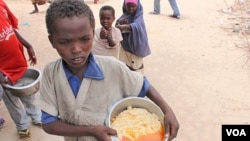Emergency aid has been flown into Somalia's capital, Mogadishu, after al-Shabaab insurgents abruptly withdrew under pressure from pro-government forces. Al-Shabaab, a terrorist group linked to al-Qaeda, has banned most foreign aid groups from operating in areas under its control, including those devastated by an on-going drought and famine. A cargo plane flown by the Office of the UN High Commissioner for Refugees landed on August 8 carrying many tons of material to be used for shelter, along with other aid, and more flights are expected over several days.
The suffering caused by the drought is horrific and the security situation is still dangerous, with wide areas of the country still controlled by armed groups opposed to the transitional federal government. Yet al-Shabaab's retreat from the capital creates both hope and opportunity to help famine victims and bolster government efforts to establish a functioning state. The United States and others in the international community have provided hundreds of millions of dollars in assistance to the region, yet many areas remain inaccessible to humanitarians who are poised to deliver life-saving food, medical supplies and other aid to those in need
Thousands of Somalis have died of starvation, many in an effort to reach camps for internally displaced people in Mogadishu. Hundreds of thousands more have fled the country entirely seeking relief in neighboring Kenya and Ethiopia. It is particularly tragic that during the Holy Month of Ramadan, militants are preventing aid reaching the most vulnerable populations in Somalia. To prevent more suffering, the United States joins the international community in urging al-Shabaab to allow aid to be freely delivered throughout the country.
A Glimmer Of Hope In Somalia

Emergency aid has been flown into Somalia's capital, Mogadishu, after al-Shabaab insurgents abruptly withdrew under pressure from pro-government forces.



